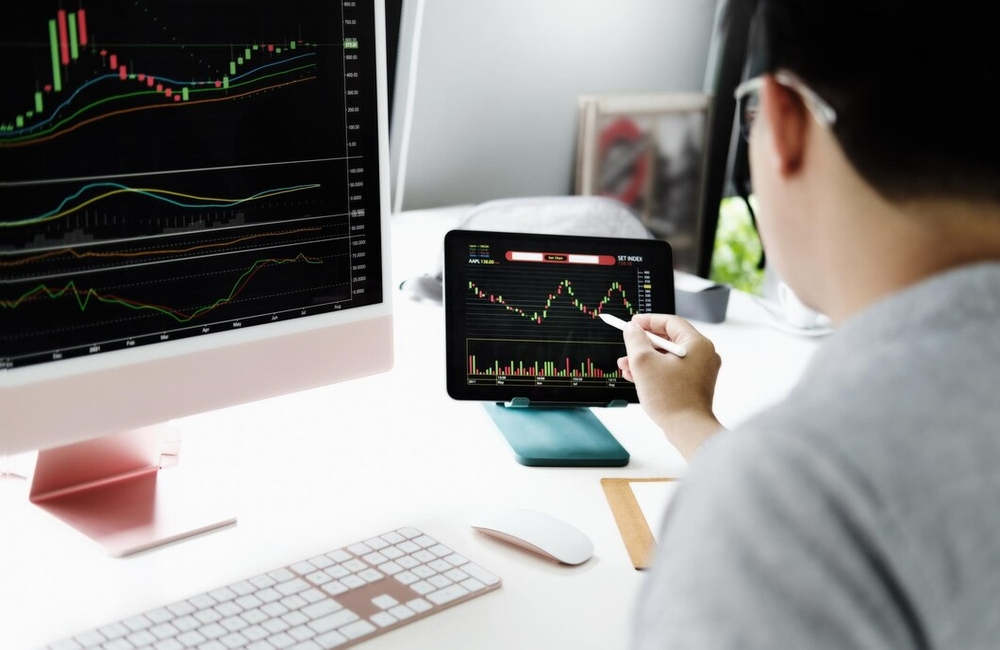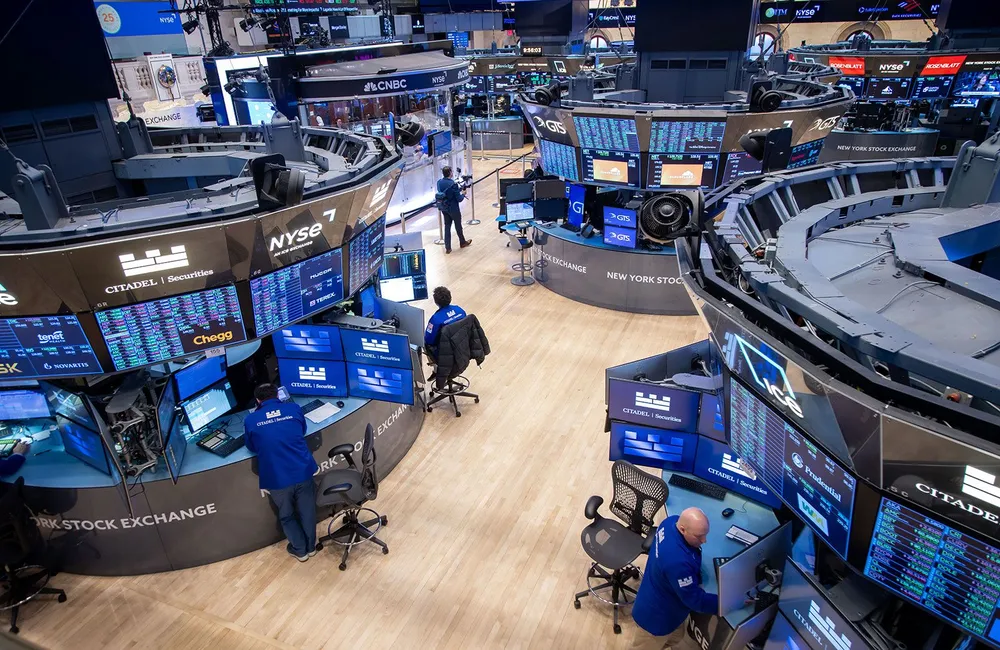A sell-off in financial markets swept the world on Friday as nervous investors faced the reality that a recession could be inevitable.
ASX futures had fallen 82 points or 1.2 per cent to 6478 by 7am on Monday AEST, suggesting a fall at the open.
Last week, investors, who are mulling stubbornly high inflation and spooked by Russia’s efforts to expand the war in Ukraine, have been headed for the exits, prompting a synchronized sell-off in both stocks and bonds. Prices tumbled and bond yields held near their highest levels in more than a decade.
The Dow fell 486.27 points, or 1.6 percent, to finish at 29,590.41 on Friday, its weakest since November 2020. The S&P 500 fell 64.76 points, or 1.7 percent, to 3,693.23. The Nasdaq Composite dropped 198.88 points, or 1.8%, to 10867.93.
The steep selloff last week adds to a period of intense volatility that has followed a speech at Jackson Hole, Wyo., by Federal Reserve Chairman Jerome Powell in August. There, he reinforced the central bank’s determination to battle inflation with a succession of interest-rate rises.
The remarks helped squelch a brief summer rally. In addition, Fed officials are projecting even higher rates than they had before, unnerving the investors who had been betting on a slowdown next year. Many fear that the Fed’s rapid rate hikes will push the U.S. into recession.
“It’s been a challenging week,” said Mike Smith, a portfolio manager at Allspring Global Investments. "Everybody's feeling pain."
Commodities
Brent Crude oil tumbled 4.76% to $US86.15 a barrel, the lowest since January. Gold fell 1.63% to US$1,643.94 an ounce.
In local bond markets, Australia’s 2-year government bond yield lifted to 3.35% and 10 year to 3.90%. Further abroad, the 2-Year US Treasury note jumped to 4.2% while the 10-Year US Treasury note was fetching 3.68%.
The Australian dollar now started at 65.31 US. The Wall Street Journal Dollar Index, which measures the U.S. currency against 16 others, ticked higher to 104.25.
Asia
Stocks in China closed in negative territory, extending losses from recent days after more central banks raised interest rates, heightening worries about a global recession. The benchmark Shanghai Composite Index dropped 0.7% to 3088.37 and the Shenzhen Composite Index retreated 1.4% to 1963.69. The tech-heavy ChiNext Price Index dropped 0.7% to 2303.91. Shares of industrial firms, such as steelmaking suppliers, electric-machinery makers, and rubber producers, led declines. Red Avenue New Materials lost 4.9% and Shenzhen Zhaowei Machinery & Electronic fell 7.3%.
In Hong Kong, the Hang Seng Index fell 1.2% to 17933.27, continuing to weaken from Thursday’s close, which was the lowest in nearly 11 years. A government announcement to scrap hotel quarantine for arriving travelers didn't lift investor sentiment, with the market’s mood still overshadowed by prospects for a weaker economy amid rising interest rates around the world. The Chinese tech industry weighed on the market, as shares of Alibaba Group, Tencent Holdings, and JD.com lost 2.8%-3.4%. Among the gainers, Cathay Pacific Airways climbed 1.0% and telecom services provider China Mobile rose 1.4%. The benchmark index was down 4.4 percent for the week.
Europe
European stocks dropped last week. The pan-European Stoxx Europe 600 lost 2.3 percent, and hit its lowest level since December 2029, while the German DAX dropped 3.59 percent and the French CAC 40 fell 2.3 percent.
A bond market upheaval has “capitulated sentiment,” CMC Markets analyst Michael Hewson wrote. “While it would be so tempting to blame some soft flash purchasing managers’ index data in things like the U.K. to a large extent, the key tick was commenting on the announcement of the latest U.K. fiscal stimulus plan which feels like it has been a high-risk leap of faith and suddenly yields went up by a lot on the concern we are going to get some inflation and concern we’re discounting too little recession risk.” There are also Italian elections coming up on Sunday, and it’s making money managers heavily risk-averse,” said Hewson.
In London, the FTSE 100 dropped 2% on Friday after U.K. Chancellor Kwasi Kwarteng revealed a ‘mini-budget’ that involved the U.K.’s largest tax cuts since the early 1970s. The pound dropped and government bond yields rose in the wake of the decision.
“The FTSE 100 has also reversed sharply, falling below the 7,000 mark for the first time in over six months, all sectors are in the red, with only healthcare gaining any traction, with energy and basic resources leading the decliners, over an increased global recession risk,” Hewson said.
JD Sports topped the losers, closing 6.7% lower, followed by Harbour Energy (6.1% down) and NatWest Group, which closed 6.1% lower.
North America
A wave of selling in financial markets reverberated around the world on Friday, as jittery investors struggled to face up to a new recession. Fresh signs of slowing global growth roiled investments of all types. The Dow Jones Industrial Average dropped to its lowest point of the year, the dollar spiked, and short-term Treasury yields soared.
Fearing stubbornly high inflation, and unnerved by Russia’s efforts to turn the war in Ukraine into a broader conflict, investors have been hitting the exits this week, driving a synchronistic selloff in both stocks and bonds. Bond yields hovered near their highest levels in over a decade as prices fell.
The Dow dropped 486.27 points, or 1.6 percent, to 29,590.41 on Friday, the lowest close since November 2020. The S&P 500 fell 64.76 points, or 1.7 percent, to 3,693.23. The Nasdaq Composite dropped 198.88 points, or 1.8%, to 10867.93.
All three indexes skidded for a second straight week in a sell-off that has slammed the S&P 500, already down 9.2 percent, and the Dow, nearly 8 percent. It was their worst two-week declines since June. The Nasdaq is down more than 10 percent over the last two weeks, the first time it has fallen so much in that time frame since March 2020, when the pandemic prompted a market crash.
The sharp drop this week follows a difficult period since Federal Reserve Chairman Jerome H. Powell delivered a speech in Jackson Hole, Wyo., in August. There, he restated the central bank’s commitment to battling inflation with a series of increases in the benchmark interest rate.
The comments helped put paid to an abbreviated summer rally. Careful investors are girding for a storm of volatility after the Fed’s determination to fight inflation came into even sharper focus this week. The central bank on Wednesday approved its third consecutive increase of 0.75 percentage point. That brought the benchmark federal-funds rate to a range not really seen since the start of 2008 and extended the most aggressive series of rate increases in decades.
Adding to this, Fed officials also forecast even steeper rates hikes than earlier anticipated, surprising investors, who had been betting a policy change in 2023. Some fear that the Fed’s rapid rate increases will push the United States into recession.
“It’s been a very tough week,” said Mike Smith, a portfolio manager at Allspring Global Investments. "Everybody's feeling pain." Rising bond yields have quickly recalibrated how much investors want to pay up for stocks across the U.S. stock market, driving the sharp swoon, said Smith.
Business surveys released Friday showed that economic activity in Europe fell sharply in September, in another reminder that growth outside the U.S. has been knocked off course. The U.S. dollar, meanwhile, is in the midst of a once-in-a-generation rally that has the potential to exacerbate the slowdown in global growth and effectively export inflation around the world.
Around the world, central banks, including in Norway, Switzerland, and South Africa, have raised borrowing costs. The global shift in favor of rate tightening has only deepened the deflation of hopes among investors of a soft landing, or a mere dent to growth rather than a full-fledged recession.
“All central banks are singing from the same hymn sheet: They’re looking to stay ahead of inflation at all costs,” said Antoine Bouvet, a senior rates strategist at ING. “The Fed really laid it out...they will go on despite the economic pain being inflicted on the economy".
US companies, among them car giant Ford and delivery behemoth FedEx, have issued profit warnings in recent weeks, heightening worries that inflation and slowing growth are beginning to erode corporate earnings. For much of this year, earnings have held up better than expected, providing a bulwark for the markets.




















